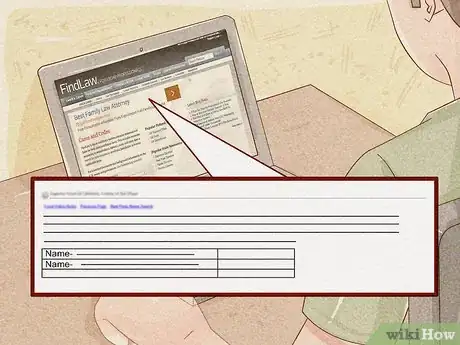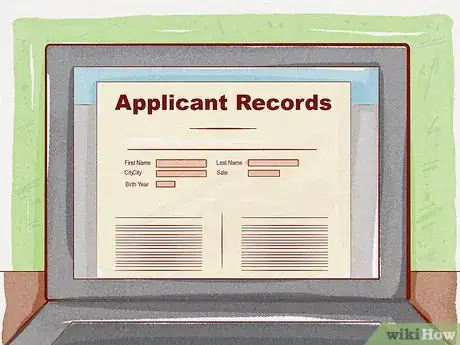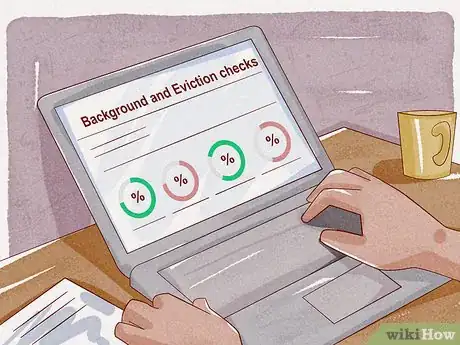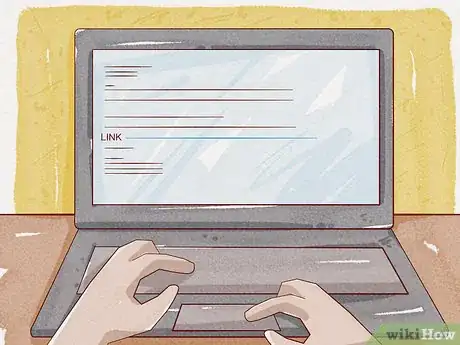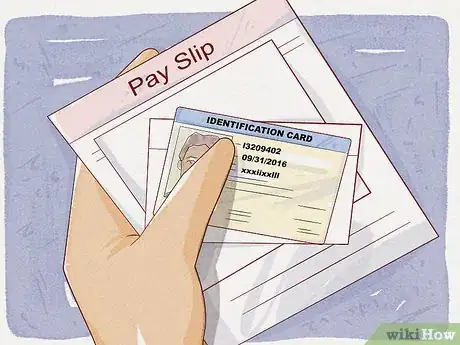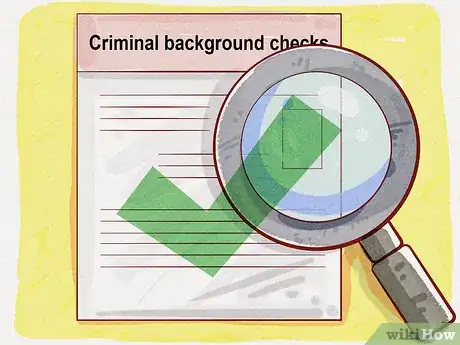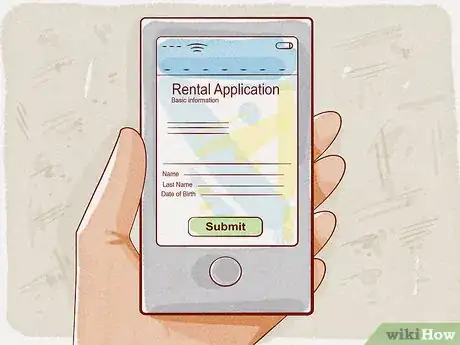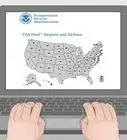This article was written by Jennifer Mueller, JD. Jennifer Mueller is an in-house legal expert at wikiHow. Jennifer reviews, fact-checks, and evaluates wikiHow's legal content to ensure thoroughness and accuracy. She received her JD from Indiana University Maurer School of Law in 2006.
There are 11 references cited in this article, which can be found at the bottom of the page.
This article has been viewed 38,881 times.
If you're renting out a house or apartment, you may want to avoid tenants who have previously been evicted. Since most U.S. courts have these records available online, you can search eviction records on the court website.[1] The accuracy of your search depends on the information provided to you by a prospective tenant, though. Online eviction report services may give you a more thorough report on your prospect.
Steps
Checking Court Records
-
1Find the appropriate court website. Most U.S. states have websites that allow you to look at all civil court records, including eviction records, for free. Depending on the state, you may not be able to look at the full record.[2]
- Search for the court website for each state where the applicant listed a previous address on their application.
- Some court records are kept online at the county level rather than the state level.[3]
-
2Search for records for the applicant. Typically you can look up court records by the name of one of the parties in the case. Run your search using the name the applicant provided on their application.[4]
- You might want to check different combinations of the applicant's name as well, such as adding in or removing a middle initial.
Advertisement -
3Double-check alternate names. Include a space on your rental application for prospective tenants to list all names they have used. If the applicant has used more than one name, search all of them to make sure there aren't any records that are slipping through the cracks.
- This is particularly common for applicants who changed their names after marriage. Search their birth name as well as their married name. For some names, you may want to search alternate spellings as well.
-
4Visit the court in person to view the full record. Court websites typically don't tell you much about a case other than that it exists. If you find a record that relates to your applicant, go to the clerk's office of that court to view the full record.[5]
- You need to learn the outcome of the case. You wouldn't want to penalize a prospective tenant if, for example, they had a retaliatory landlord who evicted them and they had the eviction dismissed in court.
- If the court is far away and you aren't able to travel there, you can typically mail a written request. Call the clerk's office beforehand to find out about copying fees.[6]
Using an Eviction Report Service
-
1Find an online service that best suits your needs. There are a number of services online that will do complete background and eviction checks for your rental applicants – for a fee. These services can potentially save you a lot of time and effort if you're managing multiple properties or have an applicant who has lived in several different states.[7]
- Online tenant report services vary in the services they offer, as well as their prices. Evaluate several before you pick the one you want.
- Check into the background of the service before you sign up for them, and make sure they're legitimate. You can look up the business with organizations such as the Better Business Bureau to find out if there have been complaints against them.[8]
-
2Get written permission from the tenant. Online report services typically run credit checks. If you are going to pull a credit report for an applicant, U.S. law requires you to get written permission from them.[9]
- You can include a consent clause on your lease application that states that by signing the application, the person gives you permission to run credit and background checks.
-
3Provide the applicant's information to the service. Online services get information to run credit and background checks in different ways. For some, you can input the information yourself directly from the rental application. Others require the applicant to create an account and provide the information.[10]
- If you're providing the information yourself, update your rental application to ask for the same information the service will need to create its reports. The more thorough information you provide to the service, the more accurate and helpful the report will be.
-
4Retrieve your report. Once the service has all the necessary information, it will provide you with a link to access the applicant's report – typically within a few days. If more information is needed, the report will tell you what went wrong.[11]
- For example, the service may not have been able to verify your applicant's Social Security number. This may have been because the number was simply typed into the service incorrectly. It may also mean that the applicant intentionally wrote the wrong number on their application.
Taking Additional Applicant Evaluation Measures
-
1Get documentation of income and employment. Independent documentation helps you verify the information that your applicants provide on their application. Pay stubs, bank statements, and personal identification are all important forms of documentation.[12]
- Analyze documents provided carefully to make sure they aren't forgeries. Asking for originals rather than copies can help cut down on this.
- Request at least two forms of official, government-issued identification. At least one ID should be a photo ID.
-
2Verify pay stubs and cash flow. Contact the employer listed to verify the income and how long the applicant has been working there. The applicant's bank statements give you some idea of their cash flow and whether they have the funds available to pay the rent each month.[13]
- If they are currently renting from someone else, check to see when the rent payments go through their bank account. Check their balance after the rent goes through each month.
- Repeated credit card payments on a bank statement may indicate a high debt-to-income ratio.
-
3Check references. On the rental application, you should ask your prospective tenants to provide you the names and contact information for 2 or 3 references. These references should be people who aren't related to the applicant, and who have knowledge of the applicant's employment or financial history.[14]
- Applicants often list friends as references, who typically won't say anything negative about the applicant and may not have enough information to be helpful. You can reduce the chance of this happening by asking for a reference with a specific relationship, such as a former employer.
-
4Use objective criteria consistently. You may not like an applicant for a personal reason, but that doesn't mean they won't be a good tenant. Establish the same eligibility criteria for all applicants, regardless of your personal feelings.[15]
- Focus solely on factors that affect whether the applicant will pay their rent on time and meet other lease obligations. Other factors, such as gender or marital status, don't affect an applicant's ability to pay rent. It is also illegal to discriminate against renters for those types of reasons.
-
5Run credit and background checks. Official credit and criminal background checks are perhaps the most solid way to assess the risk of renting to a particular applicant. Include a line in your rental application stating that by signing the application, the applicant consents to a credit and criminal background check.[16]
- Set a minimum credit score that you'll accept for applicants, and apply it consistently to all applicants.
- You may also want to set a range for which you'll accept the applicant provided they pay a larger deposit. Check your state law to see if there's a legal limit on the amount of the deposit you can ask for.
-
6Use a renter assessment application. If you're managing multiple rental properties, you may want to subscribe to an online renter screening app. You can get multiple reports, including credit, employment, income, and criminal background checks.[17]
- Many of these apps will give you an overall score for each applicant. Using the overall score instead of trying to analyze a lot of different variables can make it easier for you to make quick decisions on rental applications.
References
- ↑ https://dw.courts.wa.gov/?fa=home.namesearchterms
- ↑ https://mdcourts.gov/legalhelp/courtrecords
- ↑ http://www2.duvalclerk.com/records/
- ↑ https://www.mysmartmove.com/SmartMove/landlord-frequently-asked-questions.page
- ↑ https://dw.courts.wa.gov/?fa=home.namesearchterms
- ↑ https://mdcourts.gov/casesearch2/faq
- ↑ https://www.mysmartmove.com/SmartMove/eviction-check.page
- ↑ https://www.tenantverification.com/faq.html#Legitimate-Business
- ↑ https://www.tenantverification.com/faq.html#Written-Consent
- ↑ https://www.mysmartmove.com/SmartMove/landlord-frequently-asked-questions.page
- ↑ https://www.tenantverification.com/faq.html#problems-retrieving-reports
- ↑ https://www.zillow.com/rental-manager/resources/finding-the-perfect-tenant/
- ↑ https://www.zillow.com/rental-manager/resources/finding-the-perfect-tenant/
- ↑ https://www.zillow.com/rental-manager/resources/finding-the-perfect-tenant/
- ↑ https://www.american-apartment-owners-association.org/property-management/tenant-screening/property-managementtenant-screeninghousing-discrimination-every-landlord-needs-know/
- ↑ https://www.zillow.com/rental-manager/resources/finding-the-perfect-tenant/
- ↑ https://www.mysmartmove.com/SmartMove/landlord-frequently-asked-questions.page

